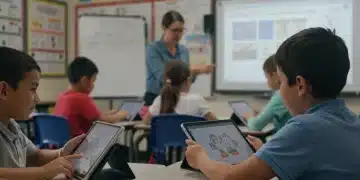Current patterns in academic success 2025 trends

Future skills needed for academic excellence include critical thinking, collaboration, adaptability, digital literacy, and resilience, all essential for navigating the evolving educational landscape and preparing for future challenges.
Current patterns in academic success 2025 trends are reshaping how students learn and engage. Have you ever wondered what skills will define future generations? Let’s dive into this changing landscape.
Understanding the 2025 academic landscape
Understanding the 2025 academic landscape is essential for students, educators, and policymakers. As classroom dynamics evolve, it’s crucial to recognize how various factors shape education today.
Shifts in Learning Methods
Students are not just passive recipients of knowledge. With the rise of technology, learning has become more interactive and engaging. Many platforms encourage collaboration and personalization. This shift means that traditional teaching methods may no longer suffice.
Key Technological Influences
We see various technologies at play in the academic sphere:
- Online Learning: Students can access resources anywhere, promoting self-directed learning.
- Artificial Intelligence: AI can help tailor learning experiences to individual needs, providing support to both students and teachers.
- Virtual Reality: This tech can create immersive learning environments, making lessons more memorable.
As these tools become more integrated into the curriculum, students gain a better understanding of complex topics. Engagement is essential, and technology plays a huge role in making learning more appealing.
The Role of Mental Health
Additionally, understanding the importance of mental health in education is crucial. As pressures increase, students must learn how to manage stress effectively. Schools are now focusing on providing resources and support systems for mental well-being. This approach not only enhances academic performance but also fosters a more positive learning environment.
Incorporating mental health programs will help students build resilience to face academic challenges. Moreover, it creates a supportive community that encourages collaboration among peers.
As we explore the 2025 academic landscape, it’s clear that these trends will significantly contribute to shaping future education. Engaging learning environments, technological advancements, and mental health awareness will redefine how students succeed.
Technological influences on student performance
Technological influences on student performance are increasingly evident in today’s educational settings. As technology grows, its impact on learning and engagement continues to reshape classrooms.
Interactive Learning Tools
One major advancement is the use of interactive learning tools. These tools empower students to participate actively in their education. For example, platforms like online quizzes and educational games enhance understanding while making lessons fun.
Furthermore, the integration of these tools leads to improved retention and collaboration among peers. Students often find themselves more motivated when learning through interactive means.
Data-Driven Insights
Another significant influence comes from data analytics. Schools can now track student progress more accurately and tailor instruction to meet individual needs.
- Performance Tracking: Educators can analyze test scores to identify struggling students quickly.
- Personalized Learning Plans: Using data, teachers can create customized plans that address specific challenges.
- Encouraging Growth: This data helps teachers provide timely feedback, which is essential for growth.
With these insights, schools can create targeted interventions that significantly boost student performance. Students can work at their own pace, ensuring they grasp important concepts.
Mobile devices also play a role in enhancing education. With access to information at their fingertips, students can research topics easily and engage with online educational communities. This accessibility breaks down barriers to knowledge and encourages independent learning.
As we see an increase in online resources, students become more self-sufficient in their studies. They learn how to use technology not just to consume information but to create and share it. These skills are crucial for success in the modern world, where technology and communication go hand in hand.
The role of mental health in academic achievement

The role of mental health in academic achievement has gained increasing attention in recent years. Students face various pressures that can affect their studies, making it essential to explore how mental well-being influences learning outcomes.
Understanding Mental Health
Mental health is about our emotional, psychological, and social well-being. It impacts how we think, feel, and act. For students, a strong mental health foundation is vital for achieving academic success. When students experience anxiety or depression, their ability to concentrate can diminish significantly.
Importance of Support Systems
Having a support system in place can help students navigate these challenges. Schools play a crucial role in fostering a positive environment:
- Access to Counseling Services: Providing professional counselors helps students work through their mental health issues.
- Peer Support Programs: Connecting students with peers who may share similar experiences creates a sense of belonging.
- Awareness Campaigns: Educating students about mental health fosters understanding and reduces stigma.
These initiatives can equip students with tools to manage stress and thrive in their academic pursuits.
Moreover, teaching coping strategies and resilience can build a more robust student body. Mental health education should be integrated into curricula to ensure students have a safe space to discuss their feelings.
Healthy habits also contribute to improved mental well-being. Regular exercise, balanced nutrition, and sufficient sleep are vital for students. When students prioritize these habits, they often find themselves more focused and better equipped to handle academic challenges.
As we delve into the connection between mental health and academic success, it is clear that fostering well-being is not just beneficial—it’s essential for students to reach their full potential.
Innovative teaching methods shaping success
Innovative teaching methods are essential for shaping success in the modern classroom. These methods not only engage students but also enhance their learning experiences. As education evolves, it’s important to explore various approaches that positively impact students.
Project-Based Learning
One popular method is project-based learning. This approach allows students to work on real-world projects that encourage critical thinking and collaboration. By tackling projects, students gain practical skills while also applying their knowledge in meaningful ways.
Flipped Classroom Model
Another effective strategy is the flipped classroom model. In this model, students learn new content at home through videos or readings and engage in hands-on activities in the classroom. This method promotes active learning and gives teachers more time to support individual student needs.
Students often report feeling more prepared and confident when they can review materials at their own pace before coming to class. This shift in how learning takes place empowers them to take charge of their education.
Incorporating Technology
Leveraging technology is also crucial in today’s education system. Innovative tools and resources can enhance learning.
- Interactive Apps: These can make lessons engaging and provide instant feedback.
- Online Collaboration Platforms: Students can work with peers globally, broadening their perspectives.
- Gamification: Turning lessons into games motivates students to learn while having fun.
By integrating these technologies, teachers can create dynamic lessons that capture student interest and promote deeper understanding.
Overall, these innovative methods help students thrive by developing essential skills such as problem-solving and teamwork. As we continue to see advancements in education, it’s clear that adopting new teaching approaches is vital for preparing students for future challenges.
Future skills needed for academic excellence
The future skills needed for academic excellence are evolving as the landscape of education changes rapidly. To succeed, students must acquire a blend of technical abilities and soft skills that prepare them for the challenges ahead.
Critical Thinking and Problem Solving
One of the most important skills for students is critical thinking. This ability helps them analyze information and make informed decisions. When students can evaluate different perspectives and solutions, they become better problem solvers.
Collaboration and Communication
Moreover, collaboration and communication skills are essential in today’s interconnected world. Students must learn to work effectively with others, both in person and online. This involves sharing ideas, listening actively, and contributing to group efforts. Successful collaboration leads to enhanced learning outcomes.
To foster these skills, schools should create more group projects and collaborative tasks that allow students to practice communicating their thoughts and ideas clearly.
Adaptability and Resilience
The ability to adapt and stay resilient is growing in importance as the future becomes more uncertain. Students need to embrace change and learn to bounce back from setbacks.
- Embracing Change: Adapting to new technologies and teaching methods will be crucial.
- Learning from Failure: Seeing challenges as opportunities to grow helps build resilience.
- Flexible Mindset: Being open to new ideas fosters innovation and creativity.
This adaptability will prepare them for various career paths in an ever-changing job market.
Finally, digital literacy cannot be overlooked. As technology continues to advance, students must be comfortable using digital tools and platforms. Understanding how to navigate the online world safely and efficiently is key to succeeding in academics and beyond.
By focusing on these future skills, educators can help students thrive and achieve academic excellence in today’s dynamic environment.
In conclusion, the path to academic success in 2025 will require a blend of essential skills such as critical thinking, collaboration, and adaptability. By embracing innovative teaching methods and focusing on mental health, educators can better prepare students for the challenges ahead. As technology continues to play a significant role in education, fostering digital literacy and resilience will be vital for achieving excellence. Together, we can create a supportive learning environment that empowers students to thrive in their academic journeys.
FAQ – Frequently Asked Questions about Future Skills for Academic Excellence
What are the key skills needed for academic success in the future?
Key skills include critical thinking, collaboration, adaptability, digital literacy, and resilience. These skills will help students navigate a changing educational landscape.
How can critical thinking improve a student’s performance?
Critical thinking encourages students to analyze and assess information, leading to better decision-making and enhanced problem-solving abilities.
Why is digital literacy important for students?
Digital literacy allows students to effectively use technology, access information, and communicate in today’s digital world, which is crucial for academic and future career success.
How can educators support the development of these skills?
Educators can incorporate innovative teaching methods, provide opportunities for collaboration, and create a supportive environment that encourages risk-taking and learning from failure.





